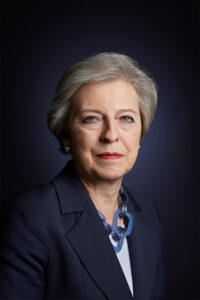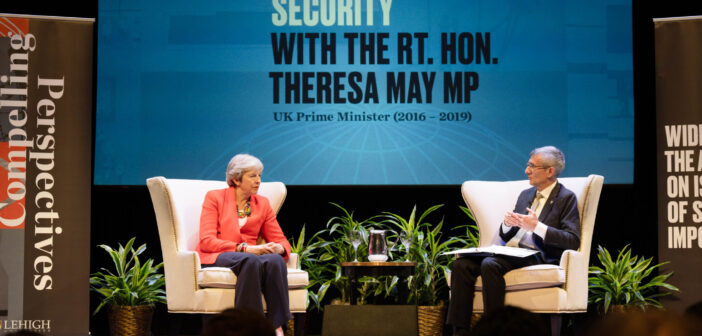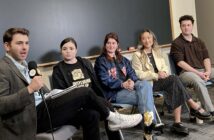Theresa May, a former prime minister of the United Kingdom, spoke to the Lehigh community in a nearly-full Baker Hall Oct. 24 for Lehigh’s inaugural Compelling Perspectives conversation.
Rt. Hon. Theresa May was the second female prime minister of the United Kingdom, serving from 2016 to 2019. Before that, she served as home secretary, becoming the longest-serving conservative home secretary in the past century.

The Rt. Hon. Theresa May MP, was the Prime Minister of the United Kingdom from 2016 to 2019. May recently released her new book, “The Abuse of Power: Confronting Injustice in Public Life.” (Courtesy of Lehigh University)
Lehigh President Joseph Helble said the aim of the Compelling Perspectives series is to bring speakers with a wide range of perspectives on current critical issues to give the campus community a chance to learn from them in a thoughtful and nuanced way.
He said this year’s focus of the series is national security in a global context.
May discussed geopolitical and national security issues, ranging from conflicts in the Middle East and eastern Europe to the threats of generative AI on democratic processes to dealing with sensitive intelligence and infrastructure.
She said a major issue at the moment is absolutism, where individuals are only capable of completely agreeing or disagreeing without looking to find a compromise. She said social media has exacerbated these echo chambers in which people surround themselves only with those who share similar viewpoints.
“She’s just written a book where she speaks about some of the challenges, the nuance and complexity, in each of these issues that can’t be reduced to soundbite solutions of the kind that you might hear in the news or read on social media,” Helble said. “This is exactly the kind of perspective we were hoping for, and I am hoping for, in bringing someone of her background and experience to campus.”
In the Q&A series following the conversation between May and Helble, three of the six audience questions were related to the conflict in Israel and Gaza.
Farah Latefa, a student at Penn State Lehigh Valley, ‘27, was one student who questioned May about politicians’ unwillingness to take strong stances on international conflict.
“I’m a bit disappointed, but not surprised that my answer regarding Israel’s attacks against the Palestinians was not answered,” Latefa said. “That’s not going to stop me from asking these politicians more questions, because we do need answers.”
Brett Ludwig, the vice president for communications and public affairs, is part of the team that created the series in conjunction with the President’s Office, General Counsel, Development and Alumni Relations, Communications and Government Relations.
He said they began talking a year ago about how to “harness the concept of freedom of expression” and express it in new, engaging ways at Lehigh. Now, he said there is a committee that works to find the topics and speakers for the series — they look for opposing experts to provide “robust, thought-provoking experiences” for the campus and surrounding community.
“We looked at experts in the field — both international experts and in the U.S. — and also we looked at select global experts,” Ludwig said.
The team decided on May, Ludwig said, because she is the former leader of one of the largest global economies with a “very distinct perspective” on the topic of national security.
The process was straightforward, Ludwig said, as they submitted a request through May’s channels, and she and her staff accepted.
Ludwig said bringing May offered a differentiated experience, as she is not known to engage in many speaking events in the U.S.. He said they received positive feedback about the series itself — which was a sign to him that the program is necessary — but choosing May as a speaker came with mixed reactions.
“If all we heard was positives about the speaker we chose, then we probably chose the wrong speaker,” Ludwig said. “Our hope is that the next speaker we announce will elicit a range of emotions and reactions as well. We kind of count on it.”
Sarah Quinn, ‘24, is a political science major who attended the event and a small student roundtable prior.
She said May is a “very moderate” politician, making it hard for her to have a compelling stance.
“Because of how she’s branded herself as a politician and because of how well known she is, she’s not in a position to take a radical stance or something that’s not in the mainstream discourse,” Quinn said.
The next speaker for the conversation on national security has not yet been announced but will come to campus during the spring semester, Ludwig said.
While there are many different speakers and endowed lecturers within disciplines on campus throughout the academic year, Ludwig said this series takes conversations that typically have disagreements a step deeper. He said this will promote critical thinking, empathy and openness that will “bridge divides and build trust” in the community.
Helble said he believes the best way to learn is to hear from people who have different viewpoints and opinions.
“I think that is exactly what college and university campuses should be doing: providing the kind of environment where each of us learns from people who see the world in different ways,” Helble said.






Comment policy
Comments posted to The Brown and White website are reviewed by a moderator before being approved. Incendiary speech or harassing language, including comments targeted at individuals, may be deemed unacceptable and not published. Spam and other soliciting will also be declined.
The Brown and White also reserves the right to not publish entirely anonymous comments.
2 Comments
Farah Latefa: “I’m a bit disappointed, but not surprised that my answer (sic) regarding Israel’s attacks against the Palestinians was not answered,” Latefa said. “That’s not going to stop me from asking these politicians more questions, because we do need answers.”
I’m sure there was an answer which those who did attend heard. What was it?
“May discussed geopolitical and national security issues, ranging from conflicts in the Middle East and eastern Europe to the threats of generative AI on democratic processes to dealing with sensitive intelligence and infrastructure.
She said a major issue at the moment is absolutism, where individuals are only capable of completely agreeing or disagreeing without looking to find a compromise. She said social media has exacerbated these echo chambers in which people surround themselves only with those who share similar viewpoints.”
Roughly 8% of the paragraphs refer to what May said. Is this because she said nothing of note but that the reporters were not interested in what was said? Obviously the reporters were more interested in what Mr Ludwig said, as over 40% was concerning him.
Rename the article “VP Ludwig Explains Compelling Perspectives Process”, and also give better reporting on the actual lecture.